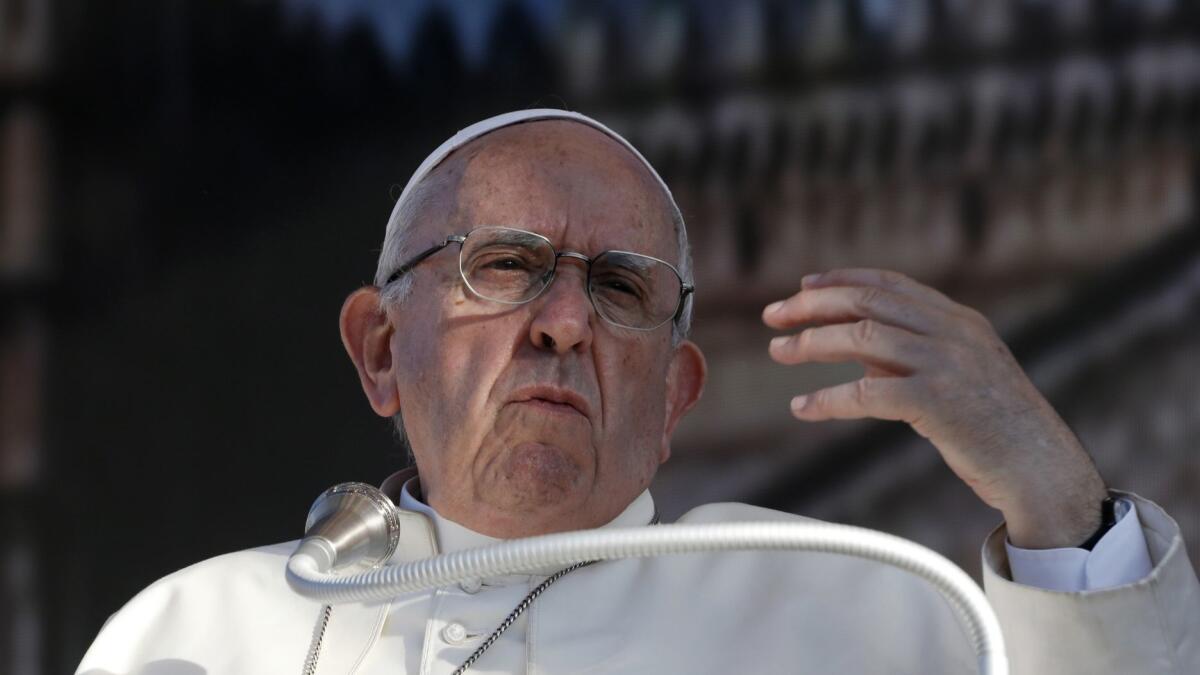Leadership of U.S. Catholic religious orders asks members to voluntarily identify priests accused of sexual abuse

- Share via
Reporting from New York — The umbrella organization of Roman Catholic religious orders in the U.S. is suggesting that its members consider voluntarily identifying priests accused of sexual abuse, opening up what could be a major new chapter in the church’s long-running abuse and cover-up saga.
The invitation to transparency by the Conference of Major Superiors of Men, which represents about a third of the 37,000 Catholic priests in the U.S., is significant because religious orders such as the Franciscans and Benedictines have largely flown under the radar during the two-decade-old scandal. In the U.S., scrutiny has focused on abuse by diocesan priests and cover-ups by their bishops.
Anticipating that the spotlight will shift amid new investigations in a dozen states, the conference will formally invite its 120 member orders to consider voluntarily publishing the names of men with an “established allegation” against them, said the Rev. Gerard McGlone, who is responsible for child protection at the conference.
“This will be coming shortly,” he told the Associated Press, confirming what he said in a panel discussion at Georgetown University this week.
The conference cannot require or even formally recommend that religious institutes release names. But the invitation to do so is nevertheless significant, since the organization’s mission is to be a resource of best practices for its members.
The conference represents more than 16,000 priests and brothers of religious congregations like the Salesians, Jesuits and Christian Brothers, who are known for their work running schools and providing services to the poor and vulnerable. Around the world, members of religious orders have been implicated in large numbers in the abuse scandal, precisely because they have had greatest access to potential young victims, said Terence McKiernan, co-founder of BishopAccountability.org, an online resource of documentation about the scandal.
“The orders have a miserable record, but the impression in the U.S. is that they have a better record. That impression is entirely wrong,” said McKiernan, who has focused much of his research on religious orders.
While there have been a few major legal cases against congregations — the Jesuits in the Northwest U.S. reached a $166-million settlement with more than 500 victims in 2011 — religious orders in general have largely “gotten a free pass,” McKiernan said. Orders are divided into provinces that cross state and diocesan lines and can fall through the cracks when dioceses are under the spotlight by law enforcement or the media, McKiernan said.
Case in point: On Friday, it was revealed that the federal prosecutor for the Eastern District of Pennsylvania had written a letter to the head of the U.S. bishops’ conference instructing all dioceses to preserve their documents about abuse. But there’s no indication that the prosecutor wrote similar letters to the superiors of all the religious orders in the U.S., potentially limiting any federal investigation to diocesan abuse cases.
More to Read
Sign up for Essential California
The most important California stories and recommendations in your inbox every morning.
You may occasionally receive promotional content from the Los Angeles Times.












